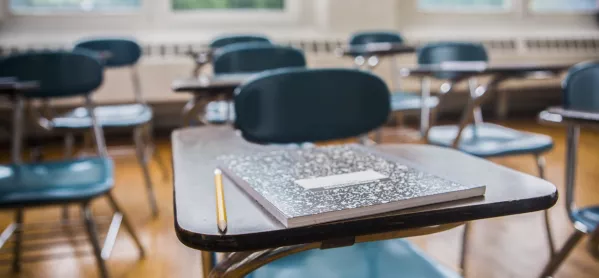Covid: Schools’ legal position on non-attendance

Ongoing disruption to children’s education due to the impact of Covid-19 continues to be a global and national concern - with the hope being that this year will finally mark a return to full, in-school education for the first time in three academic years.
But many parents may well be concerned about the risk from Covid to their children - particularly with those aged 12-15 not set to receive a Covid-19 vaccine in the UK - and perhaps even refuse to let their child attend school.
This is an emotive topic but from a legal perspective what can heads do if a parent refuses to send their child to school due to Covid concerns?
Covid: What to do if a parent refuses to send their child to school
As the new academic year begins, school attendance continues to be mandatory and the usual rules apply, with children only permitted not to attend due to Covid in limited circumstances.
While this affords heads the possibility of being tougher on school attendance and recording non-attendance as an unauthorised absence, schools should still consider the implications of each case.
The school’s safeguarding duties must also be discharged, including in relation to children missing from education and elective home education.
Parents have a legal duty to secure the education of children of compulsory school age either by regular attendance at school where their child is a registered pupil or “otherwise”.
But the law makes schools responsible for recording the attendance of registered pupils and following up absences.
Allowed reasons
As such, for each “session” schools must record a pupil’s attendance as usual or the reason for their absence.
The category “not attending in circumstances relating to Covid-19” must and can only be used to record sessions of the 2021-2022 academic year where a pupil does not attend because their travel to, or attendance at, school would be:
- Contrary to guidance relating to the incidence or transmission of Covid-19 from Public Health England or the Department of Health and Social Care, or
- Prohibited by any legislation relating to the incidence or transmission of Covid-19.
The government provides guidance to schools on using this category in School attendance: addendum recording attendance in relation to coronavirus (Covid-19) during the 2021 to 2022 academic year.
This outlines that from September 2021, schools should mark these pupils in the register using code X. This includes:
- Pupils who are required to self-isolate as they have symptoms or confirmed Covid-19.
- Pupils who are required by legislation to self-isolate as part of a period of quarantine.
- A very limited number of pupils who are clinically extremely vulnerable, when shielding is advised.
- Pupils who are self-isolating but who have not had a PCR test.
The period of time that code X will apply is now significantly more limited until the result of the confirmatory PCR test, after which the absence will be recorded as code I (illness).
What code X does not allow
Conversely, the guidance sets out that code X does not apply to other non-attendance where Covid-19 is cited as the reason, such as:
- Pupils who are clinically extremely vulnerable when shielding is not advised.
- Pupils whose parents are clinically extremely vulnerable.
- Pupils or parents who are anxious about Covid-19.
- Pupils whose parents disagree with the health and safety measures required to be in place in schools.
- Pupils who are a close contact of someone who has tested positive for Covid-19. (These pupils do not need to self-isolate. They should instead get a PCR test, and should only self-isolate if they test positive).
Schools also have a duty to follow up absences. If a pupil is “unable” to take a test and doesn’t attend school, the school must follow up with the family to make sure they are satisfied with the reason as to why they aren’t attending.
The school can request supporting evidence, and if not satisfied, record this as an unauthorised absence.
Following procedures with outside agencies
The usual provisions on safeguarding and potential local authority action will then apply where absences are recorded as unauthorised.
Schools should agree with their local authority the intervals in which they will inform them of those pupils who fail to attend regularly or have missed 10 school days without permission.
Both the school and the local authority must make reasonable checks to ascertain the whereabouts of those failing to attend school.
Anxiety about the Covid-19 pandemic and periods of remote learning have resulted in an increase in the number of parents educating their children “otherwise” than attending school.
If parents are considering elective home education (EHE) then the Keeping Children Safe in Education 2021 update now includes a new section recommending that schools work with the local authority, parents and carers before that decision is made.
Finally, while schools must provide remote education if a pupil is not attending school because their attendance would be contrary to government guidance or legislation around Covid-19, parents cannot choose remote education in other circumstances.
This reflects the law on 6 September 2021 as applicable to academies, maintained schools and independent schools for pupils of compulsory school age.
The priority is high-quality, face-to-face education and schools can and should now be more exigent in respect of what reasons are valid for not attending in circumstances relating to Covid-19 and in the supporting evidence accepted.
Nicola Tarmey is an associate at education law firm VWV
You need a Tes subscription to read this article
Subscribe now to read this article and get other subscriber-only content:
- Unlimited access to all Tes magazine content
- Exclusive subscriber-only stories
- Award-winning email newsletters
Already a subscriber? Log in
You need a subscription to read this article
Subscribe now to read this article and get other subscriber-only content, including:
- Unlimited access to all Tes magazine content
- Exclusive subscriber-only stories
- Award-winning email newsletters
topics in this article



